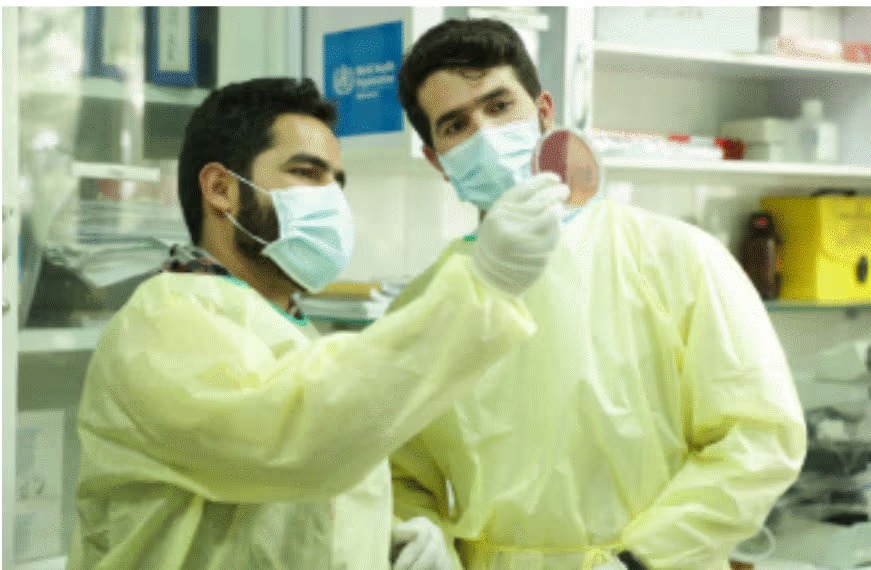Ahead of the Seventy-second Session of the World Health Organization (WHO) Eastern Mediterranean Regional Committee (RC72), Member States and partners shared their experiences of addressing antimicrobial resistance during a pre-RC72 Virtual Week session.
Discussions focused on strategies to implement integrated antimicrobial stewardship (AMS) and infection prevention and control (IPC) programmes in primary health care (PHC) facilities, with participants highlighting successful country models, the use of data for monitoring and action, digital innovations that support integrated implementation and the challenges faced in fragile and conflict-affected settings
In the Eastern Mediterranean Region, AMR is associated with nearly 373 000 deaths each year. PHCs, where most antibiotics are prescribed, are on the frontline of efforts to address AMR.
Global Research on Antimicrobial Resistance (GRAM) reports that the Eastern Mediterranean Region has the world’s highest – and fastest growing – antibiotic use. In an attempt to curb this trend countries adopted a regional, people-centered collaborative approach in 2024, aiming to address AMR by building more resilient health systems for UHC and health security.
Primary health care is the foundation of health service delivery, yet IPC practices at the PHC level in the Region are often weak. In many areas, access to water, sanitation and hygiene (WASH) is limited; as a result, antibiotics are widely prescribed in PHCs as a substitute for good WASH infrastructure and IPC and immunization services.
Strengthening IPC in PHC settings is essential to reduce infections, decrease antimicrobial demand and preserve the effectiveness of existing treatments.
Participants in the side-event explored evidence-based practices, national and facility-level monitoring tools and digital systems to support IPC and AMS integration. The session included country presentations that demonstrated how tailored strategies and system-level approaches are making a difference on the ground.
Egypt shared its experience of behaviorally informed interventions to promote responsible antibiotic use in PHC units. Bahrain described the introduction of key performance indicators (KPIs) for clinicians to monitor and reduce unnecessary antibiotic prescriptions, and Indonesia’s use of national accreditation standards for PHCs – linked to the national health insurance system – to promote IPC and AMS, was discussed in depth.
Discussions also covered the use of digital systems in PHCs under Saudi Arabia’s Ministry of National Guard Hospitals to nudge and guide prescribers, and Sweden’s experience of engaging the community, and the role of supportive supervisory visits to PHCs, in addressing inappropriate antibiotic use. The challenges of addressing AMR through IPC and AMS in fragile and conflict settings where – as Médecins Sans Frontières (MSF) highlighted – there are serious issues in accessing quality diagnostics and essential antibiotics, were also reviewed.,
In the interview with leaders’ segment, the Islamic Republic of Iran focused on the strategic role of decision-makers in reducing inappropriate antibiotic use by mandating health insurance organizations to allocate funding for the promotion of IPC and patient safety and Thailand shared the role played by a strong regulatory and policy environment in providing a reliable framework for action
Integrating IPC and AMS programmes in PHC is essential to tackling AMR, and the session was designed to help countries translate global and regional resolutions into practical, country-led actions. Discussions also underscored the value of integrating AMS and IPC within broader health system reforms, including performance management, behavioural design and financing strategies that drive sustainability.
Affordable IT and AI solutions can help scale up these efforts to low- and middle-income countries. With continued collaboration, innovation and investment, countries across the Region can position their PHC systems to lead the next phase of AMR response.
Source: WHO




 Sompaonline.com offers its reading audience with a comprehensive online source for up-to-the-minute news about politics, business, entertainment and other issues in Ghana
Sompaonline.com offers its reading audience with a comprehensive online source for up-to-the-minute news about politics, business, entertainment and other issues in Ghana